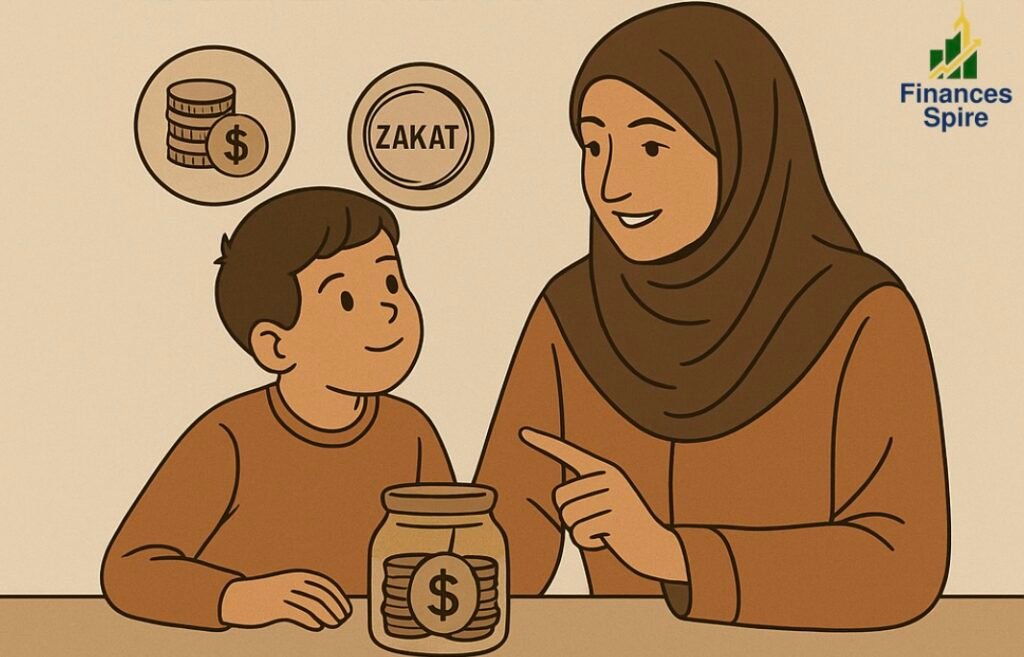Financial Education for Arab Kids: Islamic Money Guide for Parents
In today’s rapidly changing world, financial education for Arab kids is no longer a luxury—it’s a necessity. For Arab parents, teaching children about money goes beyond counting coins or saving up for a toy. It’s about building a deep-rooted understanding of responsibility, gratitude, and ethical behavior, guided by Islamic values.
This Islamic money guide offers age-appropriate tips, examples, and faith-based lessons to help parents raise financially wise, confident, and generous children.
🌱 Why Financial Education for Arab Kids Matters
Children form money habits early—by age 7, their attitudes toward saving, spending, and generosity are already taking shape.
- Build confidence and independence
- Avoid future debt or harmful spending habits
- Understand contentment, patience, and delayed gratification
- Learn Islamic concepts like barakah, zakat, and sadaqah
📚 Islamic Money Guide by Age: How to Teach Kids at Every Stage
Ages 3–6: Recognizing Money & Practicing Gratitude
Focus: Introduce money through play and story.
- Pretend store games
- Show and explain coins/bills
- Discuss what money can’t buy (love, health, family)
Islamic Concepts: Saying alhamdulillah; Wealth as amanah
Ages 7–10: Learning to Save & Share
Focus: Begin hands-on money habits with pocket money.
- Use three jars: Spend | Save | Give
- Teach needs vs wants
- Encourage sadaqah giving regularly
Ages 11–14: Budgeting Basics & Islamic Giving
Focus: Introduce budgeting and concepts like zakat.
- Plan a small family event budget
- Give simplified zakat scenarios
- Manage a home sadaqah jar
Ages 15–18: Real-Life Financial Readiness
Focus: Prepare for adult responsibilities with real-life skills.
- Open a bank account & explain debit cards
- Discuss halal investing and financial goals
- Talk about budgeting for university or a first car
🌙 Integrating Islamic Values into Financial Education
| Islamic Concept | How to Teach It |
|---|---|
| Zakat (2.5%) | Use Eid money or mock scenarios to explain its purpose |
| Sadaqah (voluntary charity) | Encourage giving daily or weekly from pocket money |
| Halal earnings | Talk about the importance of where money comes from |
| Amanah (trust) | Let children manage a small budget and review it with them |
👨👩👧 Tips for Arab Parents: Raise Money-Smart Muslim Kids
- Lead by Example: Children copy what you do more than what you say.
- Connect to Faith: Use Ramadan and Eid to tie in giving, saving, and planning.
- Celebrate Success: Acknowledge when kids reach savings goals or give to charity.
- Start Early: Don’t wait—start money conversations while they’re young.
🌟 Final Thought: Building a Generation Rooted in Rizq & Responsibility
Raising a financially literate child isn’t just about money—it’s about wisdom. Teaching financial education for Arab kids through an Islamic money guide ensures your children understand wealth as a blessing and a responsibility.
Let’s raise a generation that gives with purpose, saves with intention, and lives with barakah.
💬 What’s Your Experience?
Have you started teaching your child about money? What worked for you? Share your tips in the comments or tag us on Instagram using #MoneyWiseMuslimKids.



